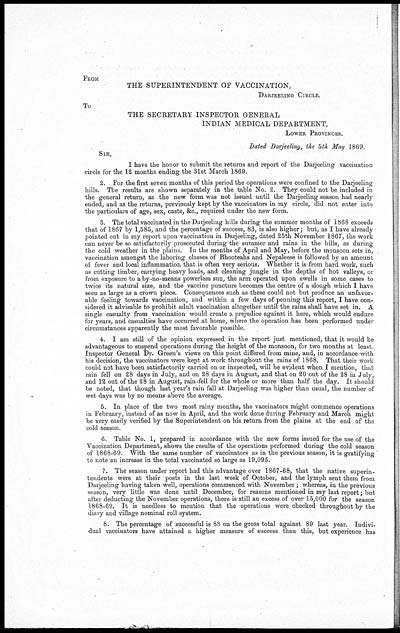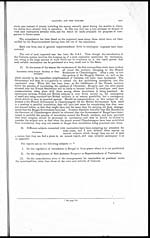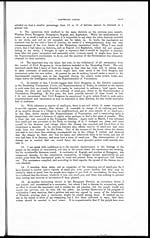Medicine - Vaccination > 1869-1873 - Report on vaccination in the Province of Bengal > Report on vaccination proceedings throughout the Government of Bengal with an appendix for the year ending 31st March 1869
(32) Page xxvi
Download files
Individual page:
Thumbnail gallery: Grid view | List view

FROM
THE SUPERINTENDENT OF VACCINATION,
DARJEELING CIRCLE.
To
THE SECRETARY INSPECTOR GENERAL
INDIAN MEDICAL DEPARTMENT,
LOWER PROVINCES.
Dated Darjeeling, the 5th May 1869.
SIR,
I have the honor to submit the returns and report of the Darjeeling vaccination
circle for the 12 months ending the 31st March 1869.
2. For the first seven months of this period the operations were confined to the Darjeeling
hills. The results are shown separately in the table No. 2. They could not be included in
the general return, as the new form was not issued until the Darjeeling season had nearly
ended, and as the returns, previously kept by the vaccinators in my circle, did not enter into
the particulars of age, sex, caste, &c., required under the new form.
3. The total vaccinated in the Darjeeling hills during the summer months of 1868 exceeds
that of 1867 by 1,585, and the percentage of success, 83, is also higher; but, as I have already
pointed out in my report upon vaccination in Darjeeling, dated 25th November 1867, the work
can never be so satisfactorily prosecuted during the summer and rains in the hills, as during
the cold weather in the plains. In the months of April and May, before the monsoon sets in,
vaccination amongst the laboring classes of Bhooteahs and Nepaleese is followed by an amount
of fever and local inflammation that is often very serious. Whether it is from hard work, such
as cutting timber, carrying heavy loads, and cleaning jungle in the depths of hot valleys, or
from exposure to a by-no-means powerless sun, the arm operated upon swells in some cases to
twice its natural size, and the vaccine puncture becomes the centre of a slough which I have
seen as large as a crown piece. Consequences such as these could not but produce an unfavor-
able feeling towards vaccination, and within a few days of penning this report, I have con-
sidered it advisable to prohibit adult vaccination altogether until the rains shall have set in. A
single casualty from vaccination would create a prejudice against it here, which would endure
for years, and casualties have occurred at home, where the operation has been performed under
circumstances apparently the most favorable possible.
4. I am still of the opinion expressed in the report just mentioned, that it would be
advantageous to suspend operations during the height of the monsoon, for two months at least.
Inspector General Dr. Green's views on this point differed from mine, and, in accordance with
his decision, the vaccinators were kept at work throughout the rains of 1868. That their work
could not have been satisfactorily carried on or inspected, will be evident when I mention, that
rain fell on 28 days in July, and on 28 days in August, and that on 20 out of the 28 in July,
and 12 out of the 28 in August, rain-fell for the whole or more than half the day. It should
be noted, that though last year's rain fall at Darjeeling was higher than usual, the number of
wet days was by no means above the average.
5. In place of the two most rainy months, the vaccinators might commence operations
in February, instead of as now in April, and the work done during February and March might
be very easily verified by the Superintendent on his return from the plains at the end of the
cold season.
6. Table No. 1, prepared in accordance with the new forms issued for the use of the
Vaccination Department, shows the results of the operations performed during the cold season
of 1868-69. With the same number of vaccinators as in the previous season, it is gratifying
to note an increase in the total vaccinated so large as 19,095.
7. The season under report had this advantage over 1867-68, that the native superin-
tendents were at their posts in the last week of October, and the lymph sent them from
Darjeeling having taken well, operations commenced with November ; whereas, in the previous
season, very little was done until December, for reasons mentioned in my last report; but
after deducting the November operations, there is still an excess of over 15,000 for the season
1868-69. It is needless to mention that the operations were checked throughout by the
diary and village nominal roll system.
8. The percentage of successful is 88 on the gross total against 89 last year. Indivi-
dual vaccinators have attained a higher measure of success than this, but experience has
Set display mode to: Large image | Zoom image | Transcription
Images and transcriptions on this page, including medium image downloads, may be used under the Creative Commons Attribution 4.0 International Licence unless otherwise stated. ![]()
| Permanent URL | https://digital.nls.uk/91534719 |
|---|
| Additional NLS resources: | |
|---|---|




